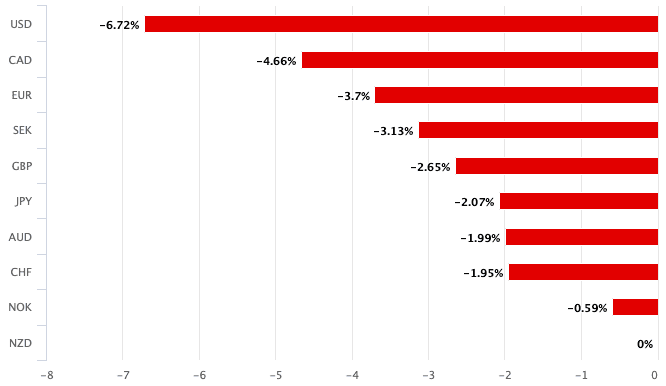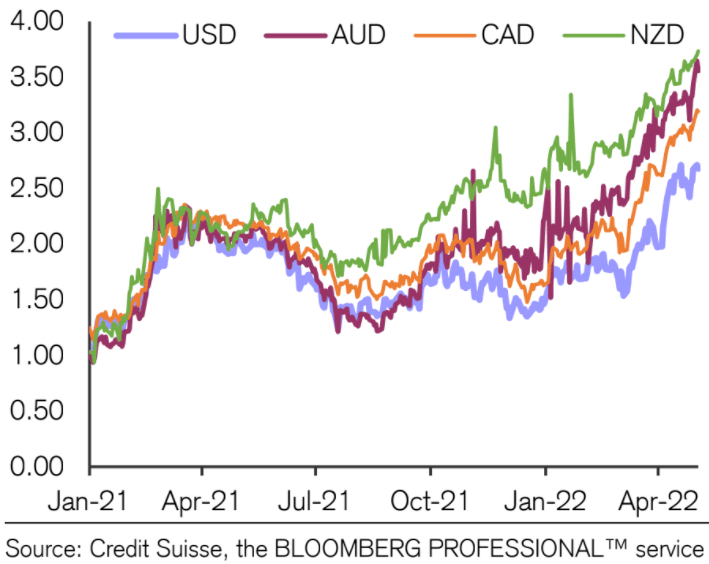New Zealand Dollar: Credit Suisse Turn Bearish
- Written by: Gary Howes

Image © Adobe Stock
Credit Suisse say they are turning bearish on the New Zealand Dollar and other 'commodity' currencies as they now see limited prospects for additional monetary policy support and a deteriorating Chinese growth outlook.
"We turn bearish on AUD and NZD," says Shahab Jalinoos, Global Head of FX Strategy at Credit Suisse in a research note out May 04.
The call by the Swiss investment bank comes in the wake of a soft April for the New Zealand Dollar which failed to benefit from a 50 basis point rate hike at the Reserve Bank of New Zealand.
April's was the fourth interest rate rise from the RBNZ since the coronavirus crisis and comes as part of an effort by the Bank to rein in inflation by withdrawing monetary stimulus from the New Zealand economy.

Above: As of May 04 the NZD is has lost ground against all peers on a month-on-month basis.
Compare GBP to NZD Exchange Rates
Find out how much you could save on your pound to New Zealand dollar transfer
Potential saving vs high street banks:
NZ$5,350
Free • No obligation • Takes 2 minutes
The New Zealand Dollar lost 2.78% in value to the British Pound in April, against the U.S. Dollar those losses were a more substantial 6.87%.
That the NZ Dollar is not responding to aggressive RBNZ hike expectations is instructive as to the outlook.
Analyst Alvise Marino at Credit Suisse says the Reserve Bank of New Zealand has surprised sharply on the hawkish side of market expectations, leading rates markets to price in even more aggressive policy tightening schedules than before.
"This in our view leaves much less scope for developments that further hawkish policy expectations at a local idiosyncratic level," says Marino.
In short, RBNZ rate hikes might have run their course in driving NZD higher.
Above: "Aggressive terminal rate expectations in commodities exporter FX creates disappointment risk" - Credit Suisse.
Marino says another catalyst of the recent commodity currency bloc's weakness can be traced once again to developments in China.
China is the most important export market for New Zealand's commodities, therefore the strength of the world's number 2 economy matters greatly for its terms of trade and currency valuation.
"Strength in commodities prices – another factor that we saw as supportive for AUD, NZD and CAD – also appears to have peaked for the time being, with the prices of the likes of iron ore, crude and dairy under pressure," says Marino. (Set your FX rate alert here).
Credit Suisse analysts say the Chinese growth outlook, caused by Covid lockdowns, has deteriorated more sharply than they had previously anticipated.
There appears to be little indication authorities in China are willing to abandon their stringent Zero-covid policy, meaning China's economic potential will remain stifled.
This creates ongoing headwinds for global growth, to the detriment of pro-cyclical currencies such as the New Zealand Dollar.
"This arguably is a much more direct concern for Australia and New Zealand than for Canada, and is likely to be reflected in ongoing CAD outperformance, even if limited, against both AUD and NZD," says Marino.
Credit Suisse's New Zealand Dollar-U.S. Dollar forecast is lowered from 0.6990 to 0.6260.
Their Australian Dollar-U.S. Dollar target is lowered from 0.7620 to 0.6900.





